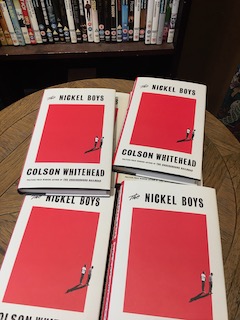Congratulations to Colson Whitehead for winning the Pulitzer Prize for his novel, The Nickel Boys. Actually, this is his second win. A few years back he won for The Underground Railroad, a story that chronicles the tribulations of a young slave girl named Cora who runs away to freedom using an actual railroad. In the story, Whitehead explores themes of oppression, brutality, abandonment and freedom. These same themes appear in The Nickel Boys, with greater emphasis placed on injustice, memory, and truth. The whole novel is a meditation on living with purpose and the different events that thwart that intention. The inspiration for the novel came from the Dozier School for Boys, an extremely abusive reform school in Mariana, Florida. The violence that took place in the school was often carried out with the approval of local officials and state businesses. Its horrors only came to light after university students and journalists discovered mass graves on the campus of the old institution.
In an interview he gave to NPR, Whitehead describes his protagonist, Elwood Curtis, as a “rare person”–a person so pure in his beliefs that it’s rare to meet someone so authentic and good. In the novel, Elwood is an idealistic college bound young man who dreams of following in the footsteps of civil rights leaders. One day, while returning home from his college preparatory classes, Elwood hitches a ride with a stranger. Soon after, the car is pulled over by the police and declared a stolen vehicle. In a blink of an eye, Elwood’s plans are derailed by this one random encounter and he is sent to Nickel Academy. Despite the setback, Elwood vows to follow the rules of the school, return home, and live the life he has mapped out for himself.
For me, reading this novel took me back to Ralph Ellison’s Invisible Man. I saw unity in Whitehead’s construction of Elwood and Ralph Ellison’s Invisible man. Both are young men of high morals; they want to contribute positively to their race. You want to believe in their idealism and sincerity because the world requires hope. In Elwood, we see many of the versions of manhood Ellison was trying to discuss. Whether its Invisible Man, Tod Clifton or the Vet; Ellison saw the disappointment and hurt that comes from idealism. In essence, both authors are asking, in a racist and volatile society—is it dangerous to espouse such candid optimism? In Invisible Man—Ellison argues yes, that for a man to live honestly and untainted by the system—they had to “plunge outside of history.” They had to embrace chaos and madness as an escape from the confines of a wrathful and unjust country. Optimism is itself dangerous. Thus, Invisible Man surrounds himself with light–he prefers life, with all its flaws, exposed and visible.
Colson is optimistic. Like Invisible Man, Elwood is a young man blinded by his earnest beliefs that education is a pathway to success. He too is disciplined, humble and resilient against constant adversity. He aspires to be a leader in the community despite living in an apathetic community. The two characters differ only in the sense that Invisible Man feels compelled, at times, to perform his role by repressing his true thoughts and instincts. Elwood, however, genuinely and courageously believes he can make a difference in the world. It is Elwood’s authenticity that allows the reader to imagine a more hopeful world. This unrestrained hope also leaves the reader with a deep sense that “any second things can go awry.”
The other protagonist in the novel is Jack Turner, a lonesome, cynical figure, who befriends Elwood at Nickel. Jack moves at his own pace. He is both visible and invisible; other characters describe him as odd and solitary. He is an orphan that has had to survive without the guidance and security of family . In many ways, Jack has accepted life on the periphery; he has managed to create a bubble for himself that is outside the gaze of the authorities. His power lies in his ability to make others believe he is feeble–a nobody that is plain and non-threatening. Yet, Elwood sees Jack’s resourcefulness and gravitates towards it. Despite their conflicting approaches to life, Jack holds Elwood in high regard. It is this uprightness that allows Jack to plunge himself outside the confines of Nickel Academy. This is a wonderful book; it makes a great companion to Ralph Ellison’s Invisible Man, Dinaw Mengiste’s All Our Names, and Jesmyn Ward’s Sing, Unburied, Sing.


